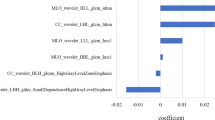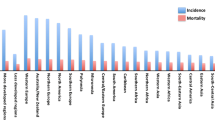Abstract
Purpose of Review
Breast cancer is a major health issue with over 2 million new cases diagnosed annually. The burden of this disease is much higher in low- to middle-income countries (LMIC) secondary to lack of access to health care, screening, diagnostic services, as well as options for treatment. Moreover, there is a lack of awareness about breast diseases, and cultural barriers often lead to late detection and patient’s presenting with stages of breast cancer.
Recent Findings
The incidence of breast cancer is increasing in Pakistan. To address the challenges of lack of awareness including cultural factors, limited resources, and importance of screening, NGOs have established free cancer screening and clinical breast exams (CBE) for women. In Gilgit, a mountainous region in Pakistan, local family doctors are being trained on how to perform effective breast exams and provide mammograms for women who meet criteria for mammography.
Summary
Women who have breast masses in Gilgit are now realizing the importance of seeking care at local clinics and hospitals as a result of this new screening program. Future research will need to focus on whether these programs are successful in identifying women with breast cancer who have early-stage disease.

Similar content being viewed by others
Data Availability
There are no datasets that can be accessed for other users.
References
Papers of particular interest, published recently, have been highlighted as: • Of importance •• Of major importance
International Agency for Research on Cancer. Key Global Cancer Data for 2020. https://www.iarc.who.int/biennial-report-2020-2021web/
Sung H, Ferlay J, Siegel RL, et al. Global Cancer Statistics 2020: GLOBOCAN Estimates of Incidence and Mortality Worldwide for 36 Cancers in 185 Countries. CA Cancer J Clin. 2021;71(3):209–49.
Ginsburg O, Bray F, Coleman MP, et al. The global burden of women’s cancers : a grand challenge in global health. Lancer. 2017;389(10071):847–60.
Wilkinson L, Gathani K. Understanding breast cancer as a global health concern. Br J Radiol. 2022;95(1130):20211033.
Arnold M, Morgan E, Rumgay H, et al. Current and future burden of breast cancer: Global statistics for 2020 and 2040. Breast. 2022;66:15–23.
Ren W, Chen M, Qiao Y, Zhao F. Global guidelines for breast cancer screening: a systematic review. Breast. 2022;64:85–99.
Buribekova R, Shukurbekova I, Ilnazarova S, et al. Promoting clinical breast evaluations in a lower middle income country setting: an approach toward achieving a sustainable breast health program. J Glob Oncol. 2018;4:1–8. Findings from this study demonstrate that instructing family practice physicians in Tajikistan on performing clinical breast exams is an effective alternative to screening women for breast cancer.
Sayed S, Moloo Z, Ngugi A, et al. Breast camps for awareness and early diagnosis of breast cancer in countries with limited resources: a multidisciplinary model from Kenya. Oncologist. 2016;21(9):1138–48.
Gadgil A, Sauvaget C, Roy N, et al. Cancer early detection program based on awareness and clinical breast examination: Interim results from an urban community in Mumbai India. Breast. 2017;31:85–9.
Kohler RE, Miller AR, Gutnik L, et al. Experiences and perceptions regarding clinical breast exam screening by trained laywomen in Malawi. Cancer Causes Control. 2017;28(2):137–43.
Zaheer S, Shah N, Maqbool SA, et al. Estimates of past and future time trends in age-specific breast cancer incidence among women in Karachi, Pakistan:2004-2025. BMC Public Health. 2019;19(1):1001–6.
Soomro R, Faridi S, Khurshaidi N, Zahid N, Mamshad I. Age and stage of breast cancer in Pakistan: an experience at a tertiary care center. JPMA. The. J Pakistan Med Assoc. 2018;68(11):1682–5.
Zeeshan S, Ali B, Ahmad K, Chagpar AB, Sattar AK. Clinicopathological features of young versus older patients with breast cancer at a single pakistani institution and a comparison with a national US database. J Glob Oncol. 2019;(5):1–6. Findings from this study demonstrate that younger women in Pakistan similar to young women in the USA have a higher rate of triple negative breast cancer.
Majeed I, Ammanuallah R, Anwar AW, Rafique HM, Imran F. Diagnostic and treatment delays in breast cancer in association with multiple factors in Pakistan. East Mediterr Health J. 2021;27(1):23–32.
Majeed A, Hafeez A, Khan S. Strengthening breast cancer screening mammography services in Pakistan using Islamabad Capital Territory as a pilot public health intervention. Healthcare. 2022;10(6):1106–12.
Ullah Z, Khan MN, Din ZU, Afaq S. Breast cancer awareness and associated factors amongst women in Peshawar, Pakistan: a Cross-Sectional Study. Breast Cancer. 2021;22(15):1178–83.
Ali A, Jameel N, Baig NN, et al. Assessment of knowledge, attitude and practice regarding breast self examination among females in Karachi. J Pak Med Assoc. 2020;70(11):1985–9.
Jabeen Z, Shah N, Ahmer Z, et al. Effect of health education on awareness and practices of breast self examination among female attending a charitable hospital at North Karachi. J Pak Med Assoc. 2021;71(9):2156–62.
Naqvi AA, Zehra F, Ahmad R, et al. Awareness, knowledge and attitude towards breast cancer, breast screening and early detection techniques among women in Pakistan. J Pak Med Assoc. 2018;68(4):576–86.
Ali A, Manzoor MF, Ahmad N, et al. The burden of cancer, government strategic policies, and challenges in Pakistan: A comprehensive review. Front Nutr. 2022;22(9):940514.
Author information
Authors and Affiliations
Contributions
Both authors have compiled the data, written the manuscript, and reviewed the manuscript.
Corresponding author
Ethics declarations
Ethics Approval
No Institutional Review Board approval was required for this study.
Competing Interests
The authors declare no competing interests.
Human and Animal Rights and Informed Consent
This article does not contain any studies with human or animal subjects performed by any of the authors.
Additional information
Publisher’s Note
Springer Nature remains neutral with regard to jurisdictional claims in published maps and institutional affiliations.
Rights and permissions
Springer Nature or its licensor (e.g. a society or other partner) holds exclusive rights to this article under a publishing agreement with the author(s) or other rightsholder(s); author self-archiving of the accepted manuscript version of this article is solely governed by the terms of such publishing agreement and applicable law.
About this article
Cite this article
Shariff, S., Amersi, F. Breast Cancer in Pakistan: Screening and Detection. Curr Breast Cancer Rep 15, 350–355 (2023). https://doi.org/10.1007/s12609-023-00514-1
Accepted:
Published:
Issue Date:
DOI: https://doi.org/10.1007/s12609-023-00514-1




